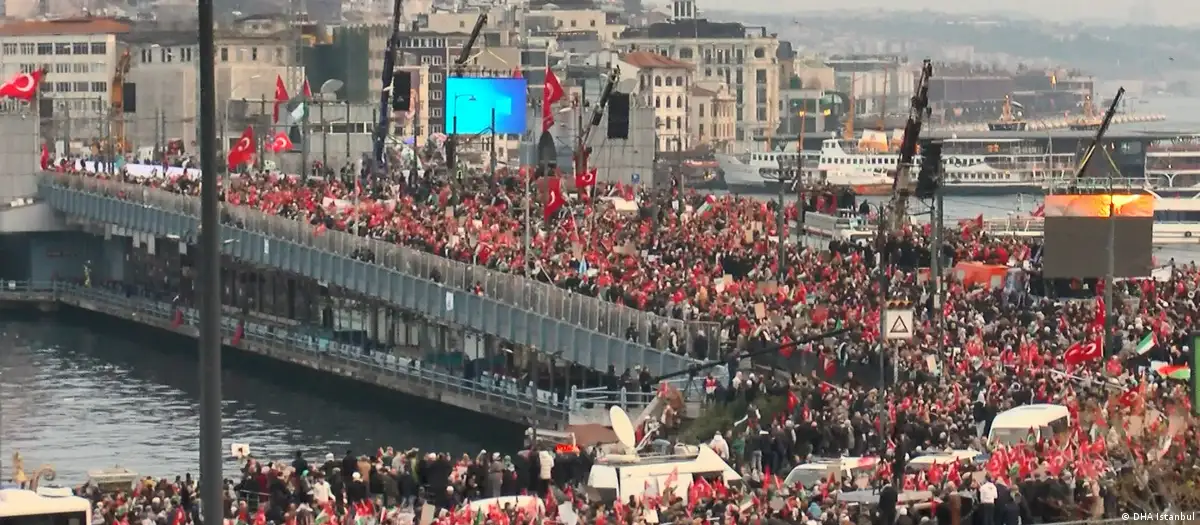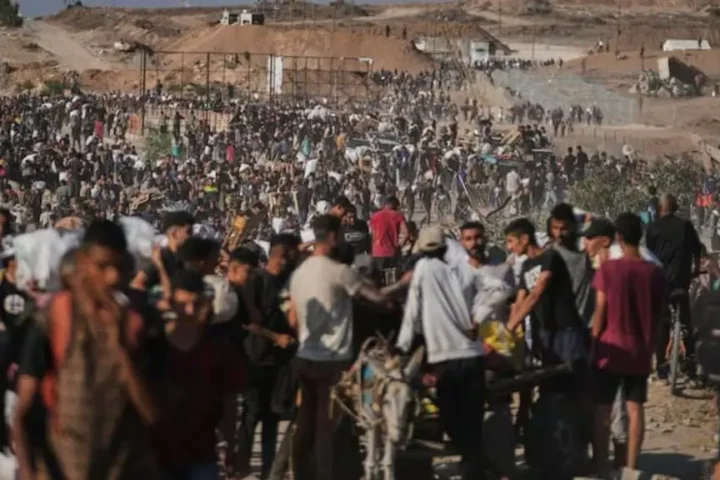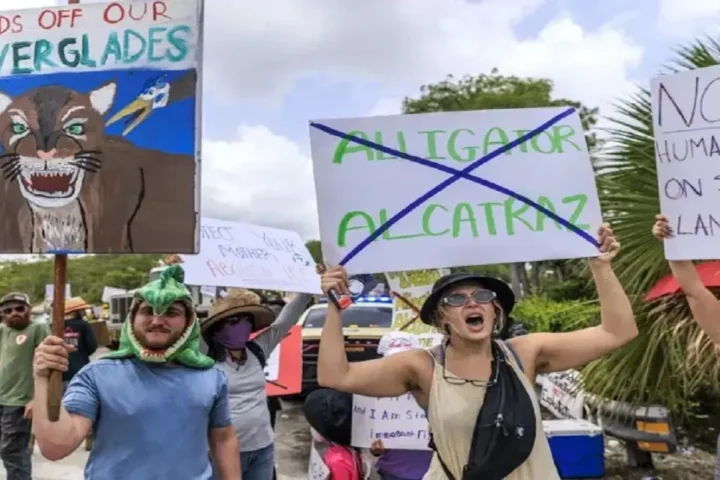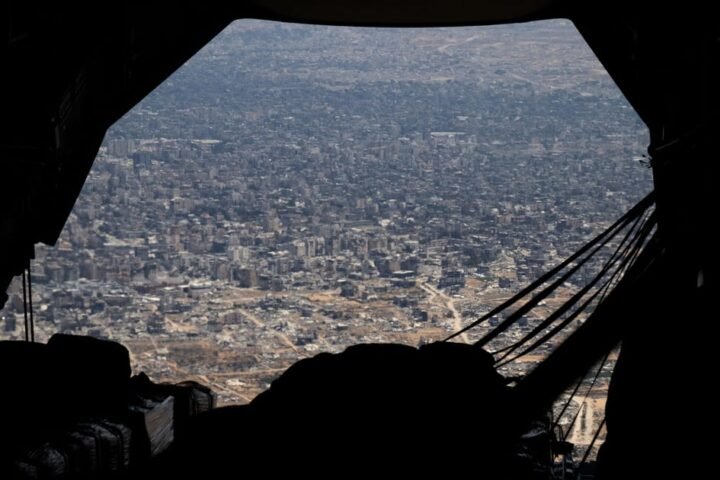Calls for sanctions on Israel over its offensive in Gaza are growing louder. France has refused to rule out curbs, while Turkey has restricted exports of dozens of products to Israel until a cease-fire is announced.
Israel’s allies have ramped up the pressure in recent weeks to allow more aid into Gaza to avert a worsening humanitarian crisis. But few have so far imposed sanctions on the Middle Eastern country boycotted Israeli products.
DW looks at what measures a handful of countries and activist movements have taken.
Turkey raises the stakes
In its first significant measure against Israel since the war began, Turkey on Tuesday announced curbs on a wide range of exports to Israel until a cease-fire is declared in Gaza.
The measure restricts sales of products from 54 categories, including steel, fertilizer, aviation fuel, bricks and construction equipment.
Turkey’s trade ministry said it had earlier stopped sending any goods that could be used for military purposes to Israel.
The new curbs follow angry protests across Turkey calling for sanctions on Israel over its offensive against the Palestinian militant group Hamas in Gaza. On Saturday, police in Istanbul detained dozens of protesters demanding an end to the trade with Israel.
The main opposition CHP has called for a total halt to trade with Israel, while other parties urged the government to block its airspace and ports to planes and vessels heading to Israel.
Turkish economist and former politician Oguz Oyan told DW that “Ankara was forced to make such a decision.” He added that during the local election campaign last month, the Erdogan government “got in trouble owing to its good trade relations with Israel. This affected the behavior of conservative voters.”
Israel’s foreign minister hit back at the curbs, saying Turkey had “unilaterally violated” bilateral trade agreements and vowed retaliation.
US, France and UK sanction Israeli settlers
Among major Western powers, only France has mooted the idea of sanctions to pressure Israel to pull back its troops from Gaza and allow more humanitarian aid to reach displaced Palestinians.
“We have multiple ways to utilize our influence; obviously, we can impose more sanctions,” Foreign Minister Stephane Sejourne told French broadcasters RFI and FRANCE 24 on Tuesday.

Sejourne was referring to very targeted sanctions imposed by the US, Canada, France and UK on settlers in the Israeli-occupied West Bank.
In February, the Biden administration named two Israeli outposts and several Israeli settlers it accused of undermining stability in the landlocked territory. The State Department said the outposts had been bases for violence against Palestinians.
The White House also imposed sanctions on multiple Israeli men it accused of being involved in settler violence in the West Bank.
The sanctions typically freeze any US assets of those targeted and generally bar Americans from dealing with them.
Canada, France and the UK imposed similar curbs on several Israeli settlers.
The Biden administration is also planning to require goods produced in West Bank settlements to be clearly marked, the Financial Times reported last week.
In 2019, the European Union’s top court ruled that goods from West Bank settlements must be labeled as coming from occupied territory and not imply that they came from Israel.

Chile blocks Israel from aviation fair
The Chilean government informed Israel last month that its companies would be banned from taking part in the 2024 International Air and Space Fair (FIDAE).
Organized by the Chilean Air Force, the fair is regarded as the main aerospace and defense show in Latin America, bringing together exhibitors from more than 40 countries.
As well as the ban, Chile canceled all cooperation or training activities on Chilean territory with Israel. The government said it would no longer purchase any weapons, defense or security systems from Israel.
In January, Chile asked the International Criminal Court in The Hague to investigate Israel’s actions in Gaza and the occupied territories.
Israel’s normalizing of ties with Arab states hits the skids
The Israel-Hamas war has halted progress on what is known as the India-Middle East-Europe Economic Corridor (IMEC) which aims to foster integration between Asia, the Persian Gulf and Europe.
The project will see new rail and shipping links built to counter China’s massive Belt and Road (BRI) infrastructure initiative. But IMEC is understood to be on hold while the conflict plays out.
There was hope the IMEC could help speed up the long-awaited rapprochement between Israel and Saudi Arabia, which the Biden administration hoped would help open the door for other Muslim countries to recognize Israel.
Arab nations have regularly condemned Israel’s aggressive tactics against civilians as it seeks to root out the Hamas militant group in Gaza. Riyadh has warned that it would only normalize relations with Israel if there is a two-state solution between the Israelis and Palestinians.
Israel established ties with the United Arab Emirates, Morocco, Sudan and Bahrain in 2020 as part of the Abraham Accords.
BDS movement urges global sanctions against Israel
Boycott, Divestment and Sanctions (BDS) is a nonviolent Palestinian-led movement promoting boycotts, divestments, and economic sanctions against Israel.
BDS co-founder Omar Barghouti says the movement drew inspiration from South Africa’s anti-apartheid movement.
BDS now has branches in 40 countries and also advocates a boycott of Israeli sporting, cultural and academic events, and calls for pressure on foreign companies that “collaborate” with Israel.
The movement is regularly accused of antisemitism by Israel and the US.
Meanwhile, several apps are helping consumers boycott businesses deemed to be supporting Israel and its war on Gaza.
The apps, including one called Boycat, allow users to scan the barcode of any product and see its links to the Middle Eastern country. The app will also offer alternative products to buy.
Source: Dw








